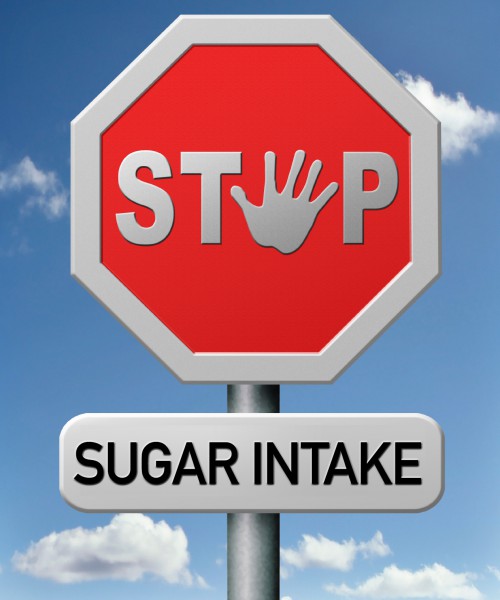Sweet poison
 Despite the fact that so many take expensive statin medication and despite the fact we have reduced the fat content of our diets, more Americans will die this year of heart disease than ever before.
Despite the fact that so many take expensive statin medication and despite the fact we have reduced the fat content of our diets, more Americans will die this year of heart disease than ever before.
Statistics from the American Heart Association show that 75 million Americans currently suffer from heart disease, 20 million have diabetes and 57 million have pre-diabetes. These disorders are affecting younger and younger people in greater numbers every year.
What are the biggest culprits of heart disease? Quite simply, they are the overload of highly processed carbohydrates (sugar, flour and all the products made from them) and the excess consumption of omega-6 vegetable oils like soybean, corn and sunflower that are found in many processed foods. These long-established dietary recommendations have created epidemics of heart disease, high blood pressure, obesity, diabetes and finally Alzheimer’s. The consequences of which dwarf any historical plague in terms of mortality, human suffering and dire economic consequences.
Science has now shown us, beyond any shadow of a doubt, that sugar in your food, in all its myriad of forms, is taking a devastating toll on your health.
So what does cause heart disease?
Inflammation in the artery wall is the real cause of heart disease. Simply stated, without inflammation being present in the body, there is no way that cholesterol would accumulate in the wall of the blood vessel and cause heart disease and strokes. Without inflammation, cholesterol would move freely throughout the body as nature intended. It is inflammation that causes cholesterol to become trapped.
Inflammation is not complicated — it is quite simply your body’s natural defence to a foreign invader such as a bacteria, toxin or virus. The cycle of inflammation is perfect in how it protects your body from these bacterial and viral invaders. However, if we chronically expose the body to injury by toxins or foods the human body was never designed to process, a condition occurs called chronic inflammation. Chronic inflammation is just as harmful as acute inflammation is beneficial.
What thoughtful person would wilfully expose himself repeatedly to foods or other substances that are known to cause injury to the body? Well, smokers perhaps, but at least they made that choice wilfully.
The rest of us have simply followed the recommended mainstream diet that is low in fat and high in polyunsaturated fats and carbohydrates, not knowing we were causing repeated injury to our blood vessels. This repeated injury creates chronic inflammation leading to heart disease, stroke, diabetes and obesity.
Take a moment to visualize rubbing a stiff brush repeatedly over soft skin until it becomes quite red and nearly bleeding. Now you kept this up several times a day, every day for five years. If you could tolerate this painful brushing, you would have a bleeding, swollen infected area that became worse with each repeated injury. This is a good way to visualize the inflammatory process that could be going on in your body right now. Foods loaded with sugars and simple carbohydrates, or processed with omega-6 oils for long shelf life have been the mainstay of our diet for six decades. These foods have been slowly poisoning everyone.
So how does sugar cause inflammation?
When your full cells reject the extra glucose, blood sugar rises producing more insulin and the glucose converts to stored fat. Blood sugar is controlled in a very narrow range. Extra sugar molecules attach to a variety of proteins that in turn injure the blood vessel wall. This repeated injury to the blood vessel wall sets off inflammation. When you spike your blood sugar level several times a day, every day, it is exactly like taking sandpaper to the inside of your delicate blood vessels.
Just take a look at the sugar consumption trends of the past 300 years:
In 1700, the average person consumed about 4 pounds of sugar per year.
In 1800, the average person consumed about 18 pounds of sugar per year.
In 1900, individual consumption had risen to 90 pounds of sugar per year.
In 2009, more than 50 percent of all Americans consume one-half pound of sugar PER DAY—translating to a whopping 180 pounds of sugar per year!
It is easy to become confused by the various sugars and sweeteners. So here is a basic overview:
– Dextrose, fructose, and glucose are all monosaccharides, known as simple sugars. The primary difference between them is how your body metabolises them. Glucose and dextrose are essentially the same sugar. However, food manufacturers usually use the term “dextrose” in their ingredient list.
– The simple sugars can combine to form more complex sugars, like the disaccharide sucrose (table sugar), which is half glucose and half fructose.
– High fructose corn syrup (HFCS) is 55 percent fructose and 45 percent glucose.
– Ethanol (drinking alcohol) is not a sugar, although beer and wine contain residual sugars and starches, in addition to alcohol.
– Sugar alcohols like xylitol, glycerol, sorbitol, maltitol, mannitol, and erythritol are neither sugars nor alcohols but are becoming increasingly popular as sweeteners. They are incompletely absorbed from your small intestine, for the most part, so they provide fewer calories than sugar but often cause problems with bloating, diarrhea, and flatulence.
– Sucralose (Splenda) is NOT a sugar, despite its sugar-like name and deceptive marketing slogan, “made from sugar.” It’s a chlorinated artificial sweetener in line with aspartame and saccharin, with detrimental health effects to match.
– Agave syrup, falsely advertised as “natural,” is typically HIGHLY processed and is usually 80 percent fructose. The end product does not even remotely resemble the original agave plant.
– Honey is about 53 percent fructose, but is completely natural in its raw form and has many health benefits when used in moderation, including as many antioxidants as spinach.
– Stevia is a highly sweet herb derived from the leaf of the South American stevia plant, which is completely safe (in its natural form). Lo han (or luohanguo) is another natural sweetener, but derived from a fruit.
Sugar is loaded into your soft drinks, fruit juices, sports drinks, and hidden in almost all processed foods—from bologna to pretzels to Worcestershire sauce to cheese spread. And now most infant formula has the sugar equivalent of one can of Coca-Cola, so babies are being metabolically poisoned from day one of taking formula.
Sweet rolls, chips and fries etc. are soaked in soybean oil; processed foods are manufactured with omega-6 oils for longer shelf life. While omega-6’s are essential, they are part of every cell membrane controlling what goes in and out of the cell — they must be in the correct balance with omega-3’s. If the balance shifts by consuming excessive omega-6, the cell membrane produces chemicals called cytokines that directly cause inflammation.
Today’s mainstream diet has produced an extreme imbalance of these two fats. The ratio of imbalance ranges from 15:1 to as high as 30:1 in favour of omega-6. That’s a tremendous amount of cytokines causing inflammation. In today’s food environment, a 3:1 ratio would be optimal and healthy.
There is but one answer to quieting inflammation, and that is returning to foods closer to their natural state. To build muscle, eat more protein. Choose carbohydrates that are very complex such as colourful fruits and vegetables. Cut down on or eliminate inflammation- causing omega-6 fats like corn and soybean oil and the processed foods that are made from them. One tablespoon of corn oil contains 7,280 mg of omega-6; soybean contains 6,940 mg. Instead, use olive oil or butter.
What you can do is choose whole foods your grandmother served and not those your mom turned to as grocery store aisles filled with manufactured foods. By eliminating inflammatory foods and adding essential nutrients from fresh unprocessed food, you will reverse years of damage in your arteries and throughout your body.
References:
http://articles.mercola.com/sites/articles/archive/2010/04/20/sugar-dangers.aspx
e281ea6c2ae759c4bda204d3566d0739b76ada82699c752664










Hilton
2019-09-26 00:26:11